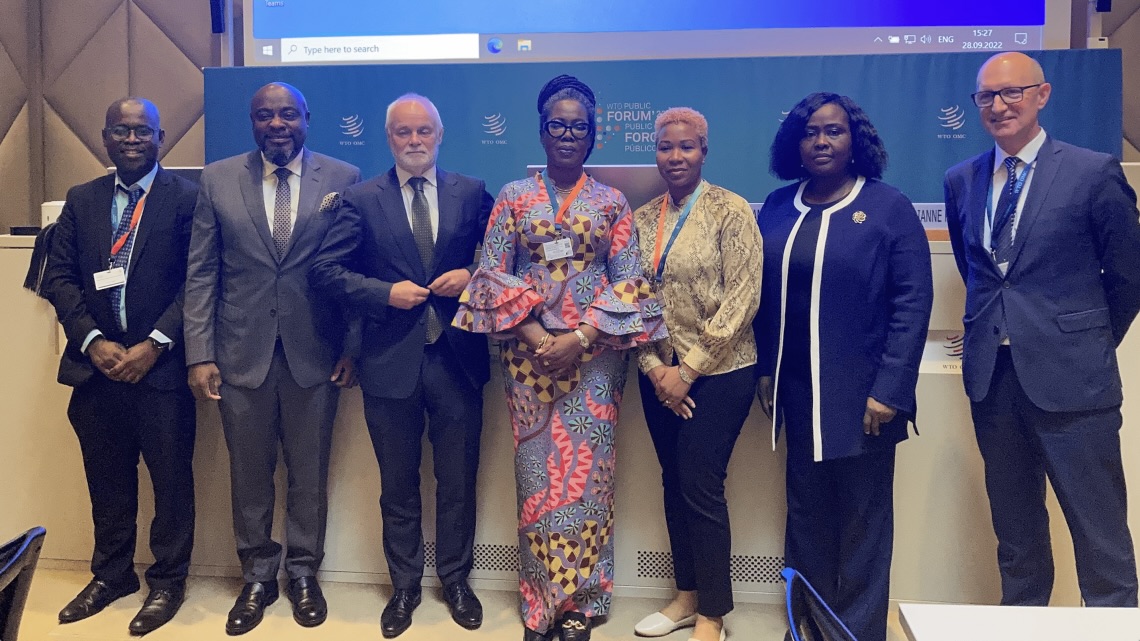Understanding the implications of emerging corporate due diligence laws for SMEs in developing countries
28 September 2022

GENEVA, 28 September 2022 - The development of due diligence legislation must be more SME-inclusive. Speakers at a session titled “From Free Trade to Fair Trade: implication for SMEs in developing countries”, held at the margins of the World Trade Organization’s (WTO) Public Forum 2022 discussed the impact that emerging mandatory corporate due diligence legislation have on SMEs in developing countries.
Jointly organized with the Permanent Mission of Ghana to the UN, the UNIDO session was conceived to enable the voices of developing countries heard in the global dialogue on sustainable trade. A paradigm shift is currently taking place in sustainable trade within global supply chains- there is a move away from a purely voluntary approach in meeting social and environmental standards to a mandatory system, with binding human rights and environmental obligations for companies. Several nations have recently adopted corporate due diligence and the European Commission is following suit at the EU member-state level. The joint development dialogue session sought to discuss how SMEs in developing countries can continue to benefit from unhindered market access.
Building on the vision of its Director General, Gerd Müller for UNIDO to be a leading platform for knowledge and technology transfer and the need for a fairer global trade system with binding international standards, the Organization prioritizes sustainability in trade. It emphasizes the importance of robust standards, social and environmental sustainability in its operations and activities, as a means of improving human wellbeing and stopping climate breakdown. UNIDO’s programmatic priority is to realize “progress by innovation” and to support the achievement of the 2030 Agenda for Sustainable Development via inclusive and sustainable industrialization.
Rita Brobey, Operations Manager and co-owner of Hendy Farms outlined the extensive challenges currently facing small holder farmers and SMEs in developing countries in complying with voluntary sustainability standards. “The investment needed to meet the required standards is quite high and the financial rewards are low. There are no incentives given or support from leading companies; limited access to information and lack of technical expertise make it even harder for us to comply”. She expressed the need for capacity building to help businesses to comply with the emerging mandatory due diligence requirements.
These concerns were echoed by Afua Asare, Chief Executive Officer of the Ghana Export Promotion Authority. “Some SMEs are genuinely under resourced and unable to comply with the new regulations due to the multiple technical barriers and high cost of the tedious processes involved and therefore risk to go out of business. Lack of knowledge of these new directives among SMEs is another threat and requires to be addressed at institutional level through capacity building”.
Speakers Jack Steijn, Co-founder of Equipoise and Guggi Laryea, Senior Manager, Stakeholder Engagement and Partnerships of Amfori, noted that there are many reasons for optimism if parallel measures are taken to reinforce a regulatory environment and support ecosystems. Using the cocoa sector as an example, cooperatives with improved internal management systems and risk assessment tools provide more added value to their members- by the same token, countries that cannot compete in the world market on volume have the opportunity to produce added value cocoa for niche markets. Both agreed that close collaboration between lead firms and their direct and indirect suppliers will be pre-conditions for unhindered market access by SMEs in developing countries.
In summary, SMEs cannot be left alone on their respective journeys to comply with future due diligence regulations. A concerted, multi-stakeholder approach is needed. With the establishment of the Division of Fair Production, Sustainability Standards and Trade in UNIDO, the Organization is ready to bring to bear its broad-based expertise, networks and technical cooperation capacity to mitigate any harmful effects on SMEs and to guarantee market access under a new paradigm of fair and just globalization.
For further information, please contact:
Division of Fair Production, Sustainability Standards and Trade (IET/PST)